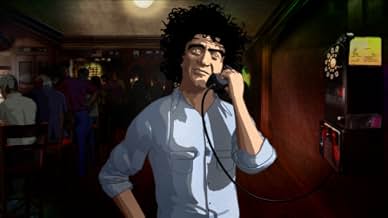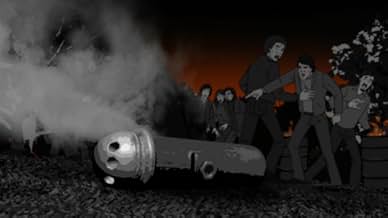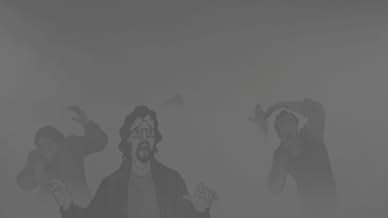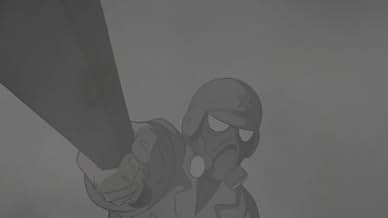CALIFICACIÓN DE IMDb
7.3/10
1.5 k
TU CALIFICACIÓN
Agrega una trama en tu idiomaArchival footage, animation, and music are used to look back at the eight anti-war protesters who were put on trial following the 1968 Democratic National Convention.Archival footage, animation, and music are used to look back at the eight anti-war protesters who were put on trial following the 1968 Democratic National Convention.Archival footage, animation, and music are used to look back at the eight anti-war protesters who were put on trial following the 1968 Democratic National Convention.
- Dirección
- Guionista
- Elenco
- Premios
- 3 premios ganados y 6 nominaciones en total
Hank Azaria
- Abbie Hoffman
- (voz)
- …
David Boat
- Norman Mailer
- (voz)
- …
Julian Rebolledo
- Reporter 2
- (voz)
- (as Julian Dean)
Daniel Hagen
- Bailiff
- (voz)
- (as Dan Hagen)
Roger Jackson
- Marshal 2
- (voz)
- (as Roger L. Jackson)
- …
- Dirección
- Guionista
- Todo el elenco y el equipo
- Producción, taquilla y más en IMDbPro
Opiniones destacadas
The time: August 1968. The place: the Chicago Amphitheater, host to that year's Democratic National Convention. The event: the riots that broke out when an assortment of "hippies, yippees and just plain kids" took to the streets to protest the US' continuing involvement in the Vietnam War. The march and sit-in, originally billed as a "Festival of Life," turned violent when the ramped-up police and National Guard forces, estimated at well over 25,000 strong, began tear-gassing and billy-clubbing the demonstrators on the last night of the convention – in full view of the nation's citizens who watched in shock and amazement as it unfolded on their TV sets at home.
The demonstrations were largely organized by The National Mobilization Committee to End the War in Vietnam, from whose leadership ranks would come many of the men destined to go down in the annals of anti-establishment folklore as the Chicago 7 (the 10 of the title comes from the inclusion of Black Panther co-founder Bobby Seale, who had his trial severed, and the two lawyers). After the incident, these men were placed on trial, charged with conspiracy and with violating the Anti-Riot Act of 1968. All seven - David Dellinger, Tom Hayden, Abbie Hoffman, William Kunstler, Jerry Rubin, Rennie Davis and John Froines – were to wind up spending at least some time behind bars for their "crimes." Written and directed by Brett Morgan, the documentary "Chicago 10" blends amazing archival footage with animated re-enactments of the trial – based on actual court transcripts – with A-list actors like Hank Azaria, Nick Nolte, Mark Ruffalo, Roy Scheider and Liev Schreiber providing the voices.
The movie provides a fascinating glimpse into not only those turbulent times but the minds of the men who helped to bring them about. For instance, it's amusing to note how the defendants treated the trial itself almost as if it were some form of subversive street-theater, in the hopes of antagonizing the conservative judge, Julius Hoffman (they really DO seem to have gotten under his skin), and destroying the court's authority in the process. Also, in the months when the trial was going on, the defendants would fan out across the country on their off-hours, lecturing on colleges campuses – with most of the speaking fees going to defray the cost of the trial - raising awareness among the students and becoming counter-culture celebrities and spokesmen for a whole new generation of politically activated youngsters. Then the men would return to Chicago to resume their roles in the trial.
The final twenty minutes or so of the movie - as we watch the government forces move in to disperse the protesters and the subsequent chaos that ensued - are riveting and eye-opening to say the least. But the whole movie is engaging and informative and reminds us of just how fragile a thing the right to free speech and assembly can be even in a country that prides itself on that being the very foundation upon which its democracy is built.
The demonstrations were largely organized by The National Mobilization Committee to End the War in Vietnam, from whose leadership ranks would come many of the men destined to go down in the annals of anti-establishment folklore as the Chicago 7 (the 10 of the title comes from the inclusion of Black Panther co-founder Bobby Seale, who had his trial severed, and the two lawyers). After the incident, these men were placed on trial, charged with conspiracy and with violating the Anti-Riot Act of 1968. All seven - David Dellinger, Tom Hayden, Abbie Hoffman, William Kunstler, Jerry Rubin, Rennie Davis and John Froines – were to wind up spending at least some time behind bars for their "crimes." Written and directed by Brett Morgan, the documentary "Chicago 10" blends amazing archival footage with animated re-enactments of the trial – based on actual court transcripts – with A-list actors like Hank Azaria, Nick Nolte, Mark Ruffalo, Roy Scheider and Liev Schreiber providing the voices.
The movie provides a fascinating glimpse into not only those turbulent times but the minds of the men who helped to bring them about. For instance, it's amusing to note how the defendants treated the trial itself almost as if it were some form of subversive street-theater, in the hopes of antagonizing the conservative judge, Julius Hoffman (they really DO seem to have gotten under his skin), and destroying the court's authority in the process. Also, in the months when the trial was going on, the defendants would fan out across the country on their off-hours, lecturing on colleges campuses – with most of the speaking fees going to defray the cost of the trial - raising awareness among the students and becoming counter-culture celebrities and spokesmen for a whole new generation of politically activated youngsters. Then the men would return to Chicago to resume their roles in the trial.
The final twenty minutes or so of the movie - as we watch the government forces move in to disperse the protesters and the subsequent chaos that ensued - are riveting and eye-opening to say the least. But the whole movie is engaging and informative and reminds us of just how fragile a thing the right to free speech and assembly can be even in a country that prides itself on that being the very foundation upon which its democracy is built.
CHICAGO 10 (2008) ***1/2 (Voices of: Hank Azaria, Dylan Baker, Nick Nolte, Mark Ruffalo, Roy Scheider, Liev Schreiber, James Urbaniak, Jeffrey Wright) Fascinating history lesson by way of state-of-the-art rotoscope animation about the infamous Chicago 10 trial of the 1968 anti-war demonstration at The Democratic National Convention led by "yippie" Abbie Hoffman curtailing into a monkey trial with dubious results and if anything a clear-eyed viewpoint of just how radical things were then and how it eerily reflects America's politics today. While the animation is hit-and-miss (and a bit eerie ala "Heavy Metal") the archival footage of the real-life instigators/participants is truly remarkable and should be seen by all who wondered what it was to live during a revolution. (Dir: Brett Morgen)
The story telling in Chicago 10 is inviting. Once inside it transforms the audience into witnesses. With your own senses you see what many have for decades refused to see. It is a work well done. 1968 was a year that changed the US of A as much as May '68 changed France. The movie is not an history lesson. This movie brings us into that time in a way that allows us to reflect not only upon what happened in Chicago, but moreover what was yet to come in the USA. The trial of the Chicago 7 almost did not happen. Ramsey Clark the US Attorney General until January 20, 1969 was not going to allow this case to be prosecuted. After January 20th, Nixon's Attorney General John Mitchell made sure that the silent majority got their show trial. It backfired. The rest is in the movie.
Brett Morgan's Chicago 10 might not deliver any groundbreaking revelations about one of the most notorious of protests-gone-bad sagas in American history, where after four days and nights (mostly) non-violent protesters and loaded-for-bear police clashed horrifically on the streets of Chicago and then the masterminds in the 'Yippies' (i.e. Abbie Hoffman, Jerry Rubin) were put on a trial where all were sent to some jail time. It's not about revelations, per-say, though one might say that the story itself- encompassing 1968's volcanic political and societal tumult- could be a revelation for some younger audience members numbed out by cable news and desensitization.
What it's about is presentation, of taking apart agitprop of the period, assembling it together with rotoscoping of the Chicago 7 trial, music from the likes of Rage Against the Machine, Eminem and the Beastie Boys, and loads of raw footage documenting much of the actual on-the-street and behind-closed-doors action in Chicago. It's probably the most striking sort one's seen since The Filth and the Fury, however in a context of instead 70s punk rock 1968's culmination of anti-war demonstration.
It's an ugly, breathtaking and (unlikely) savagely funny movie, where older viewers can experience their memories of a time and place in a sometimes bizarre and sometimes sobering context (of hindsight being '20-20') and younger viewers (i.e. guys and gals in their 20s and 30s) get a peek at an era that seems all the more ballsy in the perspective of America's involvement in Iraq. Morgan also does something a little dangerous, but successful, in portraying the "heroes" for all they were in this time and place: stalwart idealists in the guise of immature not-totally American insurgents whose 'spiritual experimenter' was oft-meditating poet-dude Allen Ginsberg. What to think of these men like Abbie Hoffmann and the leader of the Black Panthers? A little biased? Perhaps - but in light of how the trial went down, why carp?
It's editing is fast-paced, but not too much so, and its technique of animation is multi-faceted. On top of the rotoscoping (some of the best in recent memory along with A Scanner Darkly), there's a night-time demonstration done in 2-D, like something out of a nightmare with its somewhat primitive movement, and then the figures of the Chicago 7 appearing before crowds (usually with great voice-work from Hank Azaria, Dylan Baker and Mark Ruffalo, plus a great career finale from Roy Scheider as the cantankerous judge in the trial). It's the kind of visual assault that for the prepared is like a bit of ironic bliss.
If you've seen the trailer, or know a bit about the trial, or about Chicago in 68 (which Hunter S. Thompson, looking back in just 1972, said brought him to tears), or just about the friction between anti and the establishment, you'll know if this is for you. It certainly is like nothing else you'll see this year as a piece of sublime, subversive history. 9.5/10
What it's about is presentation, of taking apart agitprop of the period, assembling it together with rotoscoping of the Chicago 7 trial, music from the likes of Rage Against the Machine, Eminem and the Beastie Boys, and loads of raw footage documenting much of the actual on-the-street and behind-closed-doors action in Chicago. It's probably the most striking sort one's seen since The Filth and the Fury, however in a context of instead 70s punk rock 1968's culmination of anti-war demonstration.
It's an ugly, breathtaking and (unlikely) savagely funny movie, where older viewers can experience their memories of a time and place in a sometimes bizarre and sometimes sobering context (of hindsight being '20-20') and younger viewers (i.e. guys and gals in their 20s and 30s) get a peek at an era that seems all the more ballsy in the perspective of America's involvement in Iraq. Morgan also does something a little dangerous, but successful, in portraying the "heroes" for all they were in this time and place: stalwart idealists in the guise of immature not-totally American insurgents whose 'spiritual experimenter' was oft-meditating poet-dude Allen Ginsberg. What to think of these men like Abbie Hoffmann and the leader of the Black Panthers? A little biased? Perhaps - but in light of how the trial went down, why carp?
It's editing is fast-paced, but not too much so, and its technique of animation is multi-faceted. On top of the rotoscoping (some of the best in recent memory along with A Scanner Darkly), there's a night-time demonstration done in 2-D, like something out of a nightmare with its somewhat primitive movement, and then the figures of the Chicago 7 appearing before crowds (usually with great voice-work from Hank Azaria, Dylan Baker and Mark Ruffalo, plus a great career finale from Roy Scheider as the cantankerous judge in the trial). It's the kind of visual assault that for the prepared is like a bit of ironic bliss.
If you've seen the trailer, or know a bit about the trial, or about Chicago in 68 (which Hunter S. Thompson, looking back in just 1972, said brought him to tears), or just about the friction between anti and the establishment, you'll know if this is for you. It certainly is like nothing else you'll see this year as a piece of sublime, subversive history. 9.5/10
In 1968 thousands of young people got angry and rioted as an unpopular President expanded an unpopular war overseas. As Ryan Harvey sung recently "The Times They *Aren't* A Chaning". The documentary footage from the protests is amazing, timely, and very reminiscent of news footage from recent political protests in North America. The animated sequences could have been better. They have the look of a very low budget show on Cartoon Network. Occasionally, a different kind of animation is used and this one is less realistic but much more effective. I'm not sure why this type of animation wasn't used throughout the trial sequences.
Roy Scheider I must add was very effective and creepy as Judge Hoffman, the authoritarian and one-sided judge who presided over the trial.
The movie is a reminder that things aren't changing but it's always important to fight.
Roy Scheider I must add was very effective and creepy as Judge Hoffman, the authoritarian and one-sided judge who presided over the trial.
The movie is a reminder that things aren't changing but it's always important to fight.
¿Sabías que…?
- TriviaNick Nolte and Liev Schreiber both played the roles Gregory Peck played in the remakes of Cape Fear (1962/1991) and The Omen (1976/2006).
Selecciones populares
Inicia sesión para calificar y agrega a la lista de videos para obtener recomendaciones personalizadas
- How long is Chicago 10?Con tecnología de Alexa
Detalles
- Fecha de lanzamiento
- País de origen
- Sitio oficial
- Idioma
- También se conoce como
- Chicago 10: Speak Your Peace
- Locaciones de filmación
- Productoras
- Ver más créditos de la compañía en IMDbPro
Taquilla
- Total en EE. UU. y Canadá
- USD 177,490
- Fin de semana de estreno en EE. UU. y Canadá
- USD 42,724
- 2 mar 2008
- Total a nivel mundial
- USD 177,490
- Tiempo de ejecución1 hora 50 minutos
- Color
- Mezcla de sonido
- Relación de aspecto
- 1.85 : 1
Contribuir a esta página
Sugiere una edición o agrega el contenido que falta





































